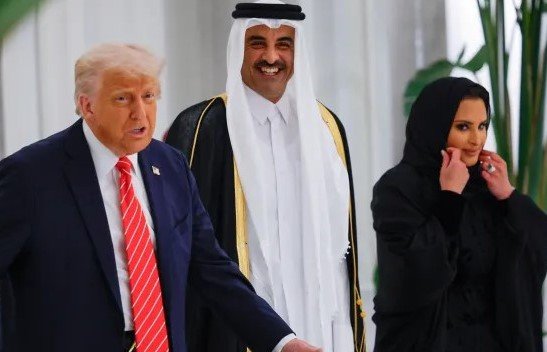May 15, Lahore – In a visit hailed by both sides as “historic,” U.S. President Donald Trump and Qatari officials signed a series of landmark agreements that could reshape regional alliances and global trade. The high-profile trip included a massive $35 billion deal between Qatar Airways and Boeing, potential U.S. military pay reforms, and a striking softening in U.S. rhetoric toward war-torn Syria.
Boeing Lands One of Its Largest Orders Ever
In a headline-making move, Qatar Airways announced the purchase of 160 twin-aisle Boeing jets, a multi-billion dollar deal hailed by Trump as a “win for American workers and a vote of confidence in U.S. aerospace innovation.”
“This deal means jobs in America and progress for Qatar,” Trump said during a joint press conference in Doha. “It’s one of the biggest aviation deals we’ve ever seen — and it happened right here.”
READ MORE: Trump revives Middle East focus: Hails Saudi alliance, eyes Syria reset, and warns Iran
Military Reform & Pay Boosts on the Table
In a widely watched speech to U.S. troops stationed in the Gulf, Trump touted ongoing military reforms and hinted at a potential pay raise for American service members.
“We’re making sure our forces are stronger, better equipped, and better paid than ever before,” Trump said, emphasizing U.S.-Qatar military cooperation. Qatar hosts the Al Udeid Air Base, the largest U.S. military facility in the region.
A Controversial Pivot on Syria
Perhaps the most controversial moment came when Trump spoke of “re-engagement” with Syria and its embattled leader Bashar al-Assad — a former enemy now viewed by some regional players as a necessary partner in restoring stability.
“Sometimes the people who were your enemies yesterday can help bring peace tomorrow,” Trump said, without directly naming Assad but clearly signaling a softening of U.S. stance toward Syria’s leadership.
Analysts say this could signal a major shake-up in Middle East alliances, as Trump courts former foes and sidelines traditional policy lines.
Geopolitical Implications
Trump’s embrace of Syria’s leadership, his bolstering of U.S.-Qatar ties, and the dramatic aviation agreement suggest a strategic pivot that could ripple through global diplomacy, commerce, and defense.
Qatar, long balancing relationships with both Western powers and regional neighbors like Iran and Turkey, appears to be deepening its bond with Washington — possibly recalibrating power dynamics in the Gulf.
As the region digests the impact of Trump’s visit, one thing is clear: the former U.S. president is still a disruptive force on the world stage.


